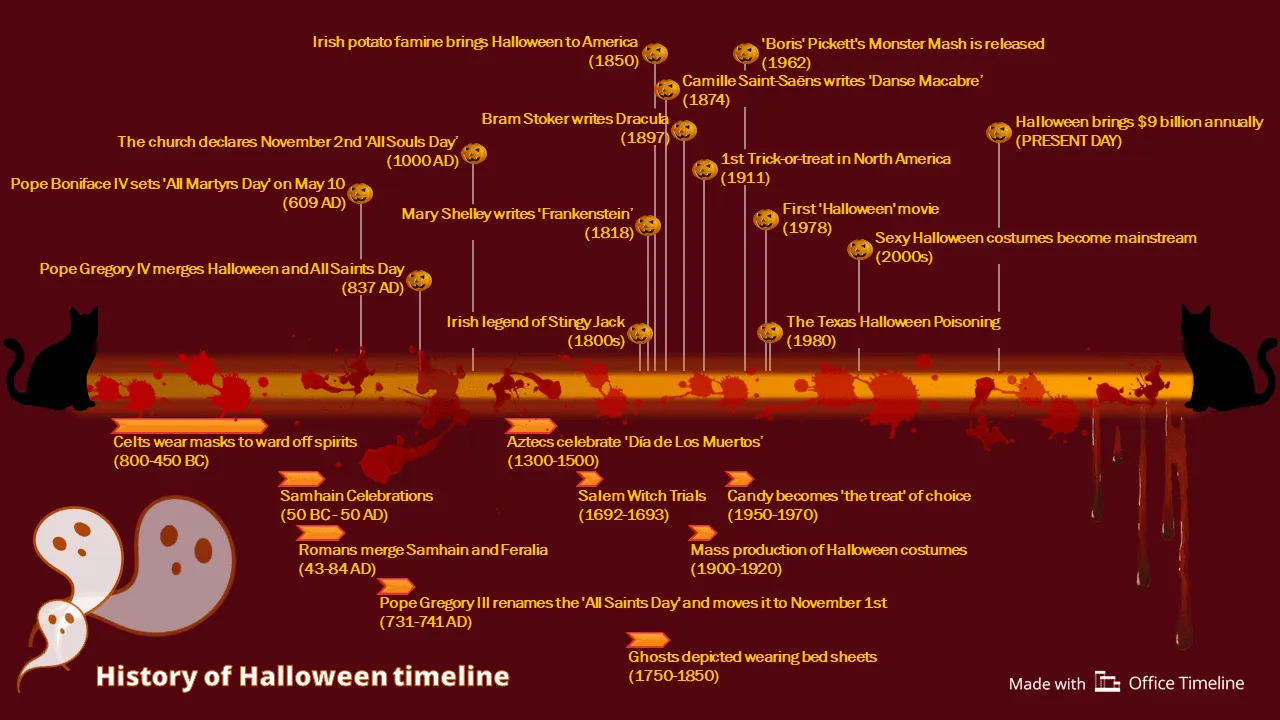History of Halloween timeline
Uncover the fascinating history of Halloween! From ancient rituals to modern-day traditions, delve into the evolution of this beloved holiday. Plus, grab your free visual timeline now! 🎃
Halloween is a holiday with a long and rich history. From its origins as a pagan festival to its modern incarnation as a day for Trick-or-Treating and costume parties, Halloween has always been a time for fun and celebration. Read on to learn more about the history of this spooky holiday and download your free visual timeline.
Bring out your dread with our spooky Halloween history timeline
Daylight grows dimmer and the remorseless cold chills you to your very core. The eyes of carved jack-o-lanterns glow menacingly from across the street, all the while a rabble of ghouls, vampires, werewolves and ghosts takes to the streets. You can sense the hunger in their hearts as they slowly approach your yard. ‘Trick or treat’… ‘trick or treat’, they chant in unison.
It’s time, you think to yourself, time to dig deep into your cache of Twizzlers, Hershey’s, Butterfingers and Twix, if you wish to see another sunrise. No tricks, just treats. You breathe a sigh of relief behind the safety of your door, as they depart. You’ve survived another Halloween and the horror of Halloween costumes. Yet you can’t help but wonder how all of this got started in the first place. Let us be your guide through the ages, your ferryman across the eons with this Halloween history timeline.
Origins of Halloween traditions: first centuries A.D.
Archaeological evidence suggests the practice of donning masks and costumes to ward off the evil spirits of the dead dates back many thousands of years, before we even left Africa, the cradle of our civilization. However, as far as celebrations go, the roots of Halloween are found in the Celtic festival named ‘Samhain’ (pronounced sow-in), from around 2000 years ago. The Celts lit massive bonfires during harvest time, at the midpoint between the autumn equinox and winter solstice. Samhain was equally about celebrating the harvest season and wearing costumes as protection against evil spirits.
After the roman conquest of their lands, the Celtic celebration was incorporated into Feralia and Pomona. The former is a festival held in the honor of the dead and the latter a praise to the goddess of fruit. Skip forward about 600 years, and we’re witnessing the establishment of an ‘All Martyrs Day’ by Pope Boniface IV. This act sets the stage for final absorption of Halloween into the Christian tradition when Pope Gregory IV merges it with the ‘All Saints Day’ set on November 1st.
Halloween history throughout the Middle Ages
By this point you’re probably wondering how a Catholic celebration got so… spooky. Sure, there is the whole component of celebrating the dead saints, but does it really answer all the questions? Let’s take another leap forward to the 1300s. In Europe, we’re witnessing a rise in the popularity of the All Hallows Eve (October 31st) – the new name for Halloween –, All Hallows Day (November 1st) and All Souls Day (November 2nd).
Meanwhile, on the yet undiscovered continent of America, the Aztecs are holding their own ‘honor the dead’ festival. This festival will eventually develop into what nowadays we know as ‘Día de Los Muertos’, celebrated across Mexico and even in some parts of the US. Mexican children might’ve asked for tiny skulls instead of candy, but who are we to judge?
Halloween history after the colonization of America
The ‘All Hallows Eve’ celebration came to America on the Pilgrim ships, and over time, it began to merge with the natives’ customs. During the 1620’s and throughout the 1690’s, a spark of anxiety regarding witchcraft practices grew into a full-on raging paranoia. This fear swept through the new continent and culminated with the Salem Witch trials. It’s also around this time that witches and black cats (allegedly also witches in disguise) were adopted into the folk stories and eventually found their way into the Halloween tradition.
The two final pieces of the puzzle – or if you prefer, nails in the coffin – namely the jack-o-lantern and the first Halloween costumes, ghosts covered in white bedsheets, were added in the 1800s. Jack-o-lanterns come from an Irish folk tale about a fellow named Stingy Jack who tried to cheat the devil and was cursed for eternity to wonder the Earth with only carved turnip lamp for guidance. White bed sheets are actually burial shrouds, and they stem from an artistic trend between 1750 and 1850.
Halloween celebrations in the modern day
One question is left to answer: how DID Halloween become the multi-billion dollar business it is today? When did we all start looking for DYI Halloween couple costumes, scary Halloween decorations, haunted houses and easy pumpkin carving ideas?
Well, haunted houses became a trend during the 1930s when parents became concerned about their kids running around door-to-door unsupervised. While mass production for Halloween costumes got kickstarted at the beginning of the century, it wasn’t until the 1950s that these getups were seen as mainstream.
Halloween costumes were originally inspired by classic novels like Dracula or Frankenstein, but soon the comic book industry started cashing in on the celebration. With regards to the movie industry, John Carpenter’s ‘Halloween’ is credited as the first gory film, which paved the way for the classic Halloween horror films we know and love today.
Frequently asked questions about Halloween
Here are the answers to some of the most important questions people ask about Halloween.
Halloween started with the ancient Celtic festival of Samhain. The Celts, who lived 2000 years ago in the area that is now Ireland, the United Kingdom and northern France, celebrated their new year on November 1. This day marked the end of summer and the harvest. Also, it announced the beginning of the dark, cold winter, a time of year that was often associated with human death. Celts believed that on the night before the new year, the boundary between the worlds of the living and the dead became blurred. On the night of October 31 they celebrated Samhain, when it was believed that the ghosts of the dead returned to earth.
Halloween is a holiday that is celebrated on October 31st. It is a day when people dress up in costumes and go trick-or-treating. Halloween is also a time when people decorate their homes with spooky decorations. Halloween takes its name from the Christian holiday All Hallows’ Eve, which is the evening before All Hallows’ Day, or All Saints’ Day. All Hallows’ Eve is also known as Hallowe’en, or the Hallowmas season.
Halloween is on October 31st because it is the eve of All Saints’ Day. All Saints’ Day is a Christian holiday that honors all of the saints and martyrs who have passed away, known and unknown.
Halloween is a popular holiday where people dress up in costumes and go door to door asking for candy. This is called trick or treating. The tradition of trick or treating is thought to have started in Britain and Ireland and has pre-Christian roots but it became more popular in the 20th century. We trick or treat on Halloween because it is a fun way to get candy and a festive way to celebrate the holiday.
About the History of Halloween timeline
The Halloween history timeline was created with Office Timeline, a powerful and easy to use Gantt chart and timeline maker add-in for PowerPoint. Create amazing project visuals in just a few clicks with the free version or, if you’re interested in more complex applications, give the tool's most advanced edition a try.
You can download the fully editable PowerPoint slide free of charge and fill in any important events you think we may have missed. On behalf of the Office Timeline team, have a very spooky Halloween!
Project management tips and tricks
Turn project data into professional timelines
Get the advanced features of Office Timeline free for 14 days.



